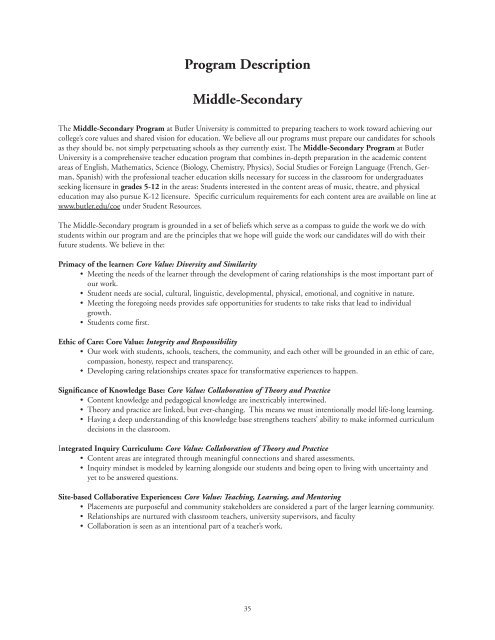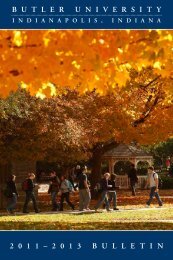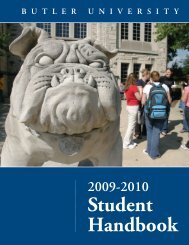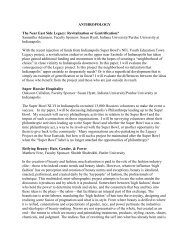Student Teaching Handbook - Butler University
Student Teaching Handbook - Butler University
Student Teaching Handbook - Butler University
You also want an ePaper? Increase the reach of your titles
YUMPU automatically turns print PDFs into web optimized ePapers that Google loves.
Program Description<br />
Middle-Secondary<br />
The Middle-Secondary Program at <strong>Butler</strong> <strong>University</strong> is committed to preparing teachers to work toward achieving our<br />
college’s core values and shared vision for education. We believe all our programs must prepare our candidates for schools<br />
as they should be, not simply perpetuating schools as they currently exist. The Middle-Secondary Program at <strong>Butler</strong><br />
<strong>University</strong> is a comprehensive teacher education program that combines in-depth preparation in the academic content<br />
areas of English, Mathematics, Science (Biology, Chemistry, Physics), Social Studies or Foreign Language (French, German,<br />
Spanish) with the professional teacher education skills necessary for success in the classroom for undergraduates<br />
seeking licensure in grades 5-12 in the areas: <strong>Student</strong>s interested in the content areas of music, theatre, and physical<br />
education may also pursue K-12 licensure. Specific curriculum requirements for each content area are available on line at<br />
www.butler.edu/coe under <strong>Student</strong> Resources.<br />
The Middle-Secondary program is grounded in a set of beliefs which serve as a compass to guide the work we do with<br />
students within our program and are the principles that we hope will guide the work our candidates will do with their<br />
future students. We believe in the:<br />
Primacy of the learner: Core Value: Diversity and Similarity<br />
• Meeting the needs of the learner through the development of caring relationships is the most important part of<br />
our work.<br />
• <strong>Student</strong> needs are social, cultural, linguistic, developmental, physical, emotional, and cognitive in nature.<br />
• Meeting the foregoing needs provides safe opportunities for students to take risks that lead to individual<br />
growth.<br />
• <strong>Student</strong>s come first.<br />
Ethic of Care: Core Value: Integrity and Responsibility<br />
• Our work with students, schools, teachers, the community, and each other will be grounded in an ethic of care,<br />
compassion, honesty, respect and transparency.<br />
• Developing caring relationships creates space for transformative experiences to happen.<br />
Significance of Knowledge Base: Core Value: Collaboration of Theory and Practice<br />
• Content knowledge and pedagogical knowledge are inextricably intertwined.<br />
• Theory and practice are linked, but ever-changing. This means we must intentionally model life-long learning.<br />
• Having a deep understanding of this knowledge base strengthens teachers’ ability to make informed curriculum<br />
decisions in the classroom.<br />
Integrated Inquiry Curriculum: Core Value: Collaboration of Theory and Practice<br />
• Content areas are integrated through meaningful connections and shared assessments.<br />
• Inquiry mindset is modeled by learning alongside our students and being open to living with uncertainty and<br />
yet to be answered questions.<br />
Site-based Collaborative Experiences: Core Value: <strong>Teaching</strong>, Learning, and Mentoring<br />
• Placements are purposeful and community stakeholders are considered a part of the larger learning community.<br />
• Relationships are nurtured with classroom teachers, university supervisors, and faculty<br />
• Collaboration is seen as an intentional part of a teacher’s work.<br />
35

















